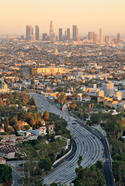Southern California, once the center of one of the world's most vibrant business communities, has seen its economic leadership become largely rudderless. Business interests have been losing power for decades, as organized labor, ethnic politicians, green activists, intrusive planners, crony developers and local NIMBYs have slowly supplanted the leaders of major corporations and industries, whose postures have become, at best, defensive. read more »
Newgeography.com - Economic, demographic, and political commentary about places
Where Inequality Is Worst In The United States
Perhaps no issue looms over American politics more than worsening inequality and the stunting of the road to upward mobility. However, inequality varies widely across America. read more »
The Great Skills Gap Myth
One of the great memes out there in trying to diagnose persistently high unemployment and anemic job growth during what is still, I argue, the Great Recession is the so-called “skills gap”. The idea here is that the fact that there are millions of unfilled job openings at the same time millions of people can’t find work can be chalked up to a lack of a skills match between unemployed workers an open positions. read more »
No Fundamental Shift to Transit: Not Even a Shift
The American Public Transportation Association (APTA) is out with news of higher transit ridership. APTA President and CEO Michael Melaniphy characterizes the new figures as indicating "a fundamental shift going on in the way we move about our communities.” Others even characterized the results as indicating "shifting consumer preferences." The data shows either view to be an exaggeration.
1935 and 2013 read more »
City of Villages
Los Angeles is unique among the big, world-class American cities. Unlike New York, Boston, or Chicago, L.A. lacks a clearly defined core. It is instead a sprawling region made up of numerous poly-ethnic neighborhoods, few exhibiting the style and grace of a Paris arrondissement, Greenwich Village, or southwest London. In the 1920s, the region’s huge dispersion was contemptuously described—in a quotation alternately attributed to Dorothy Parker, Aldous Huxley, or H. L. Mencken—as “72 suburbs in search of a city.” Los Angeles’s lack of urbane charm led William Faulkner to dub it “the plastic asshole of the world.” But to those of us who inhabit this expansive and varied place, the lack of conventional urbanity is exactly what makes Los Angeles so interesting. read more »
- Login to post comments
The Reinvention of Sanford, Florida
Sanford, Florida was in the midst of reinventing itself. Then the calamity of Trayvon Martin’s violent death turned this sleepy Florida town into a poster child for everything that's wrong with the state. Now that the media frenzy has moved on to other troughs, the residents must sweep up the mess. As is often the case, compassion and healing have been operating quietly in the background. read more »
- Login to post comments
Taking the Main Street Off-ramp
To some, the $19 billion paid by Facebook for the Silicon Valley start-up What's App represents the ultimate confirmation of the capitalist dream. After all, these riches are going first and foremost to plucky engineers whose goals are simply to make life better for the public. Got a problem with that? read more »
East of Egan: Success in California is Not Evenly Distributed
The New York Times ran a Timothy Egan editorial on California on March 6. The essay entitled Jerry Brown's Revenge was reverential towards our venerable Governor. It did, however, fall short of declaring Brown a miracle worker, as the Rolling Stone did last August. These and other articles are part of an adoring press's celebratory spasm occasioned by the facts that California has a budget surplus and has had a run of strong job growth. read more »
- Login to post comments
Work Access in the Non-centered San Francisco Bay Area
The San Francisco Bay Area (San Jose-San Francisco combined statistical area or CSA) has a superior access to work systems, including its important work at home element. The freeway system provides primary access between all points, importantly supplemented by arterial streets, and accounts for nearly 70 percent of all work trips. read more »
The U.S. Cities Profiting The Most In The Stock Market And Housing Boom
If anything positive can be said for the current tepid economic recovery, it has been very good to those who invest in the stock market or own real estate.
Property owners have been able to reap higher rents and sale prices, and the stock market has soared while the overall economy has registered only modest gains. However, only a precious few have benefited from the bull market on Wall Street. read more »




















